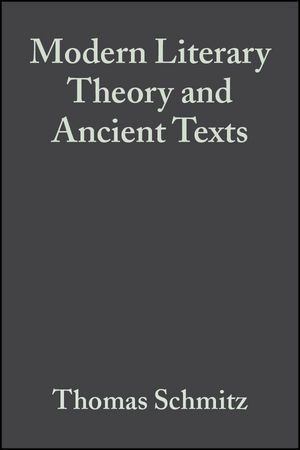Modern Literary Theory and Ancient Texts: An IntroductionISBN: 978-1-4051-5374-4
Paperback
252 pages
October 2007, Wiley-Blackwell
 This is a Print-on-Demand title. It will be printed specifically to fill your order. Please allow an additional 10-15 days delivery time. The book is not returnable.
Other Available Formats: Hardcover
|
||||||
Acknowledgments ix
Acknowledgments for the English Translation x
Introduction 1
What Is, and To What End Do We Study, Literary Theory? 1
Literary Theory and Classics 4
Objections Raised against Literary Theory 6
How to Use This Book 11
Introductions to Literary Theory 13
1 Russian Formalism 17
The Question of Literariness 19
Roman Jakobson’s Model of Linguistic Communication 21
Poetic Language as Defamiliarization 23
Further Reading 25
2 Structuralism 26
The Founder of Structuralism: Ferdinand de Saussure 27
Saussure’s Definition of the Linguistic Sign 29
The Meaning of Differences 30
Structuralism and Subject 33
Structural Anthropology 34
Is Structuralist Interpretation Possible? 38
Structuralist Definitions of Literary Genres 40
Further Reading 42
3 Narratology 43
Vladimir Propp’s Analysis of the Folk Tale 44
Greimas’s Actantial Theory of Narrative 47
Roland Barthes and the Study of Narrative Texts 50
Structuralist Plot-Analysis: Gerard Genette 55
Irene de Jong’s Narratological Analysis of the Homeric Epics 60
Further Reading 62
4 Mikhail Bakhtin 63
Bakhtin’s Life and the Problem of His Writings 64
Dialogism and the Novel 66
The Carnivalization of Literature 69
Menippean Satire and Ancient Carnivalesque Literature 71
Further Reading 76
5 Intertextuality 77
Leading the Way: Julia Kristeva 77
Further Developments of Intertextuality 78
Gerard Genette’s Model of Hypertextuality 80
Intertextuality in Virgil 83
Further Reading 85
6 Reader-Response Criticism 86
Empirical Reception Studies 87
Aesthetics of Reception 88
American Reader-Response Criticism 91
Wheeler’s Analysis of Ovid’s Metamorphoses 94
Further Reading 96
7 Orality – Literacy 98
Oral Cultures: The Theses of Goody and Watt 99
What Does “Orality”Mean? 102
Oral Poetry 104
The Homeric Epics as a Test Case 106
Further Reading 111
8 Deconstruction 113
The Foundations: Derrida’s Criticism of Logocentrism 114
Deconstruction in America 120
Objections to Deconstruction 122
The Role of the Author 124
Stanley Fish’s Model of “Interpretive Communities” 127
The Responsibility of the Interpreter 130
Deconstruction’s Merits and Demerits 136
Deconstruction in Antiquity? Socrates und Protagoras 137
Further Reading 139
9 Michel Foucault and Discourse Analysis 140
The Power of Discourse 141
Objections to Foucault’s Analysis of Discourse 145
Foucault and Antiquity 149
The Debate about Foucault’s Interpretation of Ancient Sexuality 153
Further Reading 157
10 New Historicism 159
New Historicism and Deconstruction 160
New Historicism and Michel Foucault 165
Objections to New Historicism 167
New Historicism and Antiquity 172
Further Reading 174
11 Feminist Approaches/Gender Studies 176
The Feminist Movement and Definitions of “Woman” 176
Feminism in Literary Criticism 178
French Feminism 180
Pragmatic Feminism in Literary Criticism 182
From Images of Women to Gender Studies 187
Queer Theory 189
Gender Studies and Attic Drama 191
Further Reading 193
12 Psychoanalytic Approaches 195
Interpreting Dreams, Interpreting Literature 197
Three Attempts at Psychoanalytic Interpretation 200
Language and the Unconscious: Jacques Lacan 202
Further Reading 204
Conclusions? 205
Whither Now? 207
Additional Notes 209
References and Bibliography 215
Index 233



